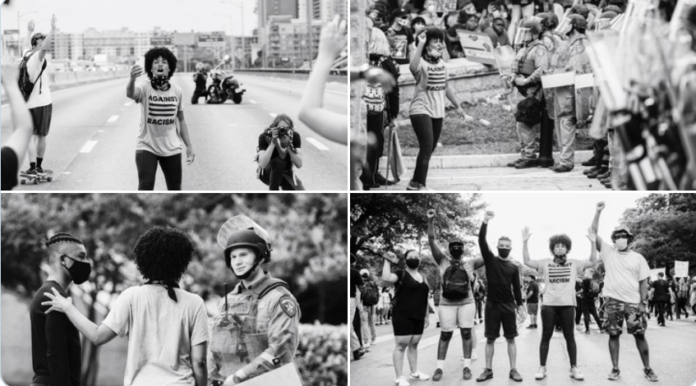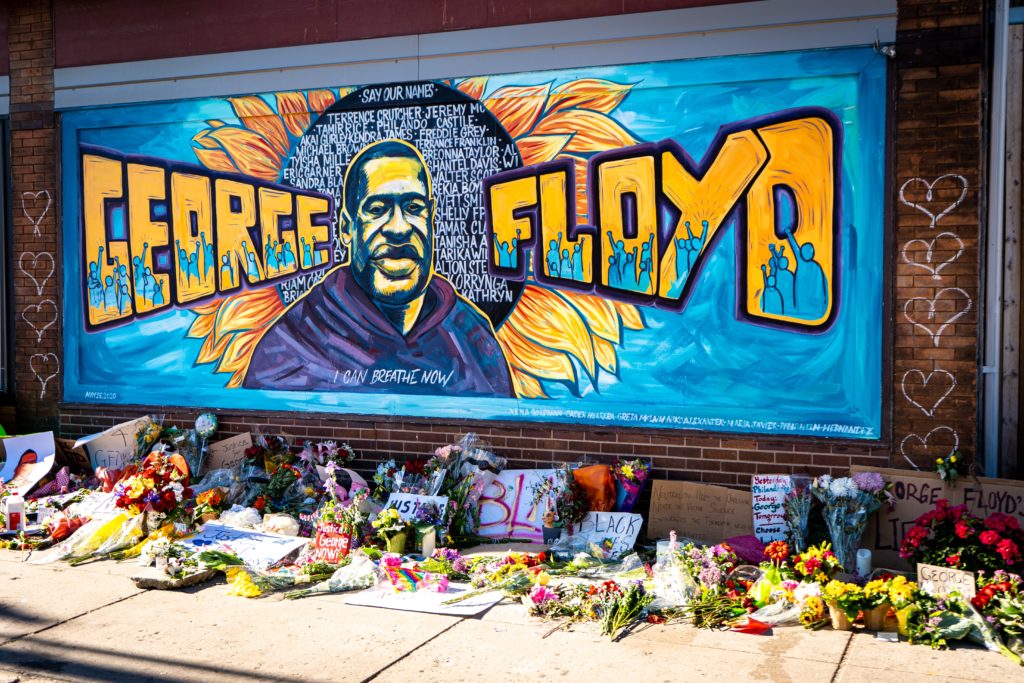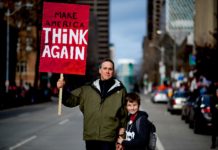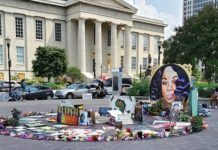
Editor’s note: On Wednesday, June 3 at 1 p.m., the author will co-host Justice and Equity in a Time of National Racial Crisis: A Community Conversation. Sign up and join here.
American cities are in upheaval, awakened by the duel pandemics of COVID-19 and white supremacy, which has resulted in 40 million people out of work and the spectacle of George Floyd’s death at the hands of the Minneapolis police.
Dozens of American cities are experiencing a scale of protests, clashes between police and demonstrators, and National Guard deployments not seen since the “long hot summers” of racial discontent and crisis that characterized much of the 1960s. Sympathy protests in Berlin and London’s Trafalgar Square outside the U.S. Embassy have drawn thousands of demonstrators who not only insist that “Black Lives Matter!” but reflect widespread global resistance against racial injustice manifested in the criminal justice system.
We are witnessing a level of national civil unrest that recalls the aftermath of Dr. Martin Luther King Jr.’s assassination on April 4, 1968, when 125 cities exploded in protest and violence. From peaceful demonstrations to clashes between protesters and Secret Service agents outside the White House, a national racial crisis is unfurling before our very eyes.
The public execution of George Floyd, a 46-year-old Black man, by Minneapolis police last week has sparked national protests that have, in some instances, evolved into open political rebellion contoured by violent skirmishes between police and demonstrators and the destruction of property. Racial unrest gripping major American cities, against the backdrop of the global COVID-19 pandemic, reflects the contemporary magnitude of racial injustice.
A national tragedy should be turned into a generational opportunity
The inhumanity of Floyd’s death heaped further indignity on African American communities suffering disproportionately from the brutal effects of the COVID-19 pandemic. Black folk have been diagnosed with, and died from, COVID-19 at alarming rates. The killing of George Floyd represents a national tragedy that should be turned into a generational opportunity.
Black death at the hands of the police is not new. Black Lives Matter (BLM) protests erupted in 2014, turning a hashtag commemorating the mounting number of African Americans killed, assaulted, and brutalized by the police and displayed in social media, into a social movement that combined the non-violent civil disobedience of the civil rights era with Black Power’s structural critique of white supremacy and anti-Black racism.
BLM activists argued that America’s criminal justice system represents a gateway to panoramic systems of racial and economic oppression. The criminalization of poverty has long roots, but the past four decades have institutionalized systems of punishment that have deepened and exacerbated racial inequality. During the 1980s and 1990s, as violence, crime, and poverty raged against the backdrop of the crack cocaine explosion, both Democrats and Republicans competed with each other over how best to criminalize black inner city residents. Ronald Reagan’s tough on crime rhetoric and policies begat George H.W. Bush’s use of Willie Horton and Bill Clinton’s crime and welfare “reforms” that further criminalized black communities and made it virtually impossible to successfully re-enter society by blocking avenues to employment, education, and housing after release.
The eruption of the BLM movement during the second term of Barack Obama, America’s first black president, illustrates how deeply entrenched the issues related to George Floyd’s death are. Donald J. Trump’s open embrace of white supremacists—from Charlottesville, Virginia’s 2017 demonstrations that left one woman dead to anti-government militias that marched to the Michigan state house in defiance of shelter-in-place orders armed with semi-automatic weapons—has fanned the flames of racial intolerance and police violence against black communities.
Austin is implicated in America’s tragic racial history
Austin is implicated in America’s tragic racial history, from the 1928 “Master Plan” that institutionalized racial segregation as citywide policy, to the decades-long efforts to fully integrate the University of Texas, to the gentrification of the historic East Side neighborhood at the cost of longstanding black residents, businesses, and communities. Racial integration in Austin has since proceeded in fits and starts, with segregated public schools and neighborhoods remaining the comfortable norm. Gentrification along the city’s East Side has largely displaced Austin’s historic black residents who find themselves compelled to depart neighborhoods just as they are flooded with the kind of investment that attracts white families, creates high achieving schools, increases home owner values, and thriving communities.
As if to acknowledge this history, activists blocked Interstate-35 on Saturday, the highway serving as a barrier between black and white Austin by design, locking Austin’s African American communities from access to white spaces, properties, and power.
The problems of racial segregation, poverty, and criminal justice that have scarred Minneapolis are national, impact Austin and other major cities around the country and, indeed, the world.
Austin, one of the nation’s fastest growing, wealthiest, and well positioned urban cities, has a unique opportunity to emerge as a national leader on the issue of racial justice.
The University of Texas at Austin, with the motto that “what happens here changes the world,” can be a major part of the city’s much needed transition from its current status as an enviable hub of technology, education, venture capital, and music into a national incubator of social justice, equity, inclusion, and full citizenship for all Austinites.

On this score the Center for the Study of Race and Democracy, a center devoted to research, study, and social policy impact at the intersection of civil rights, race, and democracy, will be sponsoring an event designed to build community, forge networks, and problem-solve around issues of racial injustice that reverberate from Minneapolis to Austin and beyond. Justice and Equity in a Time of National Racial Crisis: A Community Conversation will feature Mayor Steve Adler, Councilwoman Natasha Harper-Madison, Councilwoman Alison Alter and be moderated by myself and Jeremi Suri, my colleague at the LBJ School of Public Affairs.
The protests erupting around the nation attest to a dearth of national leadership on race matters and the very meaning of American democracy. In times of national crisis—from the Great Depression to the Second World War to Civil Rights and 9-11—we come to better understand ourselves as Americans.
The fact that George Floyd could outlive the COVID-19 pandemic only to run into the even deadlier virus of white supremacy is both a national tragedy and a generational opportunity.
An opportunity to confront deep-seated racial inequities plaguing Austin
All of us can and must do more. From civil rights and faith communities to education, political, and business leaders, we must seize the combined tragedies of a pandemic that has killed more than 100,000 Americans and the tragedy of another unjustified killing of a black person at the hands of our justice system as an opportunity to finally confront deep-seated racial inequities that plague this city as much as any other.
Austin can turn this national moment of grief and mourning into a marker of public shame or a symbol of American renewal, with the knowledge that our city led the way in recognizing that a full commitment to anti-racist public policy and racial justice would allow us to achieve the community and nation we dream about.
How does an anti-racist Austin look? We can start by acknowledging the stubborn persistence of racial segregation in our city’s public schools and neighborhoods, a fact that amplifies opportunity gaps in education, employment, and housing and helps to create a feedback loop of racial disparities in rates of poverty, treatment before the criminal justice system, access to electoral politics, small business loans, venture capital and so much more. We must identify and understand negative disparities as part of systemic racism rather than behavior deficiencies in black people. We must root out injustice and inequities based on race in our policies, forging a community where racial equity centers our public conversation about the larger political good. So many Austinites of good will recognize aspects of the problem, but are unsure of where to begin, what organization to join, what would be the best use of their resources.
The Center for the Study of Race and Democracy’s Justice and Equity event is the first step in what we hope will be a socially impactful, politically relevant, and politically transformative movement in Austin to not only redress past mistakes but to acknowledge, repair, and build a future Austin worthy of our citizens.
If you like what you’ve been reading, please click here to subscribe and we will send you updates and our newsletter.





